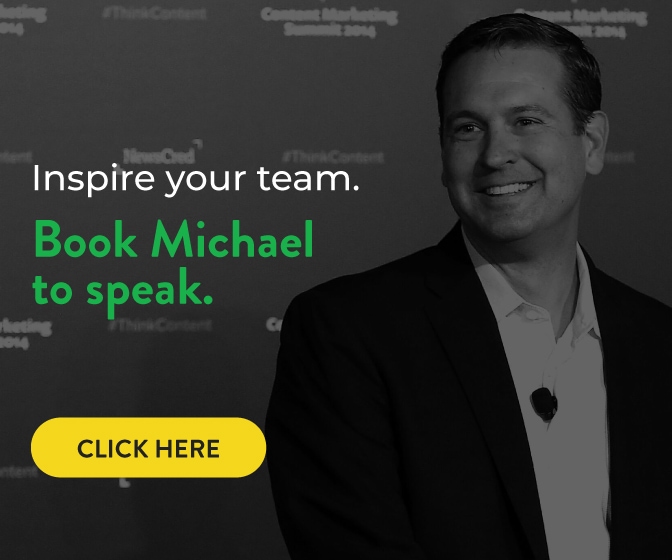If you’re reading this, then I think you probably get the value of marketing storytelling. It’s a powerful thing and is often a catalyst for redefining what marketing means to a company. Storytelling has been a pillar of content marketing for some time, but stories aren’t just great for consumer audiences. They work for B2B companies as well, even in the most unconventional industries like commercial real estate.
Today, I’m bringing you the story of Jill Kouri, who I was lucky enough to meet years ago. She’s one of the most esteemed marketing leaders, and she totally gets why storytelling matters.
As CMO of Jones, Lang, and Lasalle (JLL), she focused on creating compelling stories and stacking her team with gifted storytellers. It was her interview in the Association of National Advertisers (ANA) that I found fascinating, and it became an inspiration for the book.
Quick Takeaways
- Marketing storytelling is one of the most important tactics you can use to engage your audience.
- Tell human stories, no matter what industry you’re in or who your audience is.
- Build a team of storytellers that are motivated and engaged.
- Choose to be an empathetic leader.
Storytelling Eclipses Promotion
If you look back at the evolution of marketing, it really started out as advertising. It was all about selling a product, and the focus was on the product and how magical it is. While we’ve moved past that somewhat in the 21st-century, there are still plenty of brands that didn’t get the memo.
It’s not to say advertising isn’t effective. Hey, when you see that pizza commercial on TV, you probably get a craving. In many scenarios, however, to hook a customer, you’ve got to have a story. That story doesn’t need to be all about your brand; it should be about your customer. That’s what empathetic storytelling is.
It has the opportunity to help you redefine what marketing means for your company. That’s the approach that Jill Kouri took when she became JLL’s CEO. Now, you may be feeling a bit cynical about what kind of empathetic stories a commercial real estate business could tell.
You’d be surprised. What Jill did when she stepped into the role was to make marketing communications a strategic function. She was a pioneer in thinking that a B2B company had stories to tell and connections to build. And it worked.
Tell Human Stories, Even If You Aren’t Sure How at First

Still finding it hard to believe that a commercial real estate giant was able to tell human stories? Well, if you think about the type of content that might be interesting to their audience, you’d have to bring up case studies. A lot of case studies, however, are pretty dry and don’t follow a narrative.
Jill and her team knew there was more to the content than just facts and numbers, which are useful but don’t really incite emotions or encapsulate knowledge. Jill knew their role was to help clients achieve their goals and dreams. And that’s where she found the amazing stories to tell.
How Did Jill Do It?
She started by building a team of storytellers, saying, “We are committed to maintaining a culture that unleashes the full potential of all employees. We recognize that diversity is a core component of our business and the right thing to do for our workforce and communities.”
She was about to redefine how JLL interacted with their clients and audience. She developed a new content hub, called Ambitions, which highlighted stories about their clients. The client was the hero of the story. JLL simply played a supporting role in helping them accomplish their ambitions.
To generate interest in the content and to make it easy for their audience to find, they used many platforms. When their magazine would be released, online videos would support that content.
Beyond customer stories, JLL also began to tell their own story. This was an opportunity for their audience to get to know them, not as some corporate façade but as a group of real people doing real work.
The content took off and became must-see and must-read. Jill and her team never forgot the human element of every story and what it meant to the audience.
This Is a Marketing Story but Also a Team Story

Jill could have easily taken credit for everything and been a manager that others would have frankly said, sucked. But that’s not the road that Jill took. Instead, she proved herself to be a leader with character and integrity. The hero of Jill’s story was actually her team of storytellers. These highly engaged and motivated employees became one of the company’s most valuable assets.
Jill is a great example of a champion leader, which is a style of leadership that focuses on motivating employees, driving innovation, and delivering tangible results. Champion leaders all have one thing in common—empathy!
They do not look at their staff and think, these are tools for me to use in my game of finding personal success. They look at their team and think, “I want these people to be happy to come to work and be in an environment that lets them grow and freely share ideas.”
If you are in the position of being a leader, don’t take it for granted. Your actions and your perspective have a huge impact on others, not only your direct reports but the entire company. You get to make a choice every day of whether you’re going to build up your team or knock them down. Seems like an easy enough choice, yet here we are still living in a world of mean people.
So, what are your thoughts? I encourage you to pick up a copy of Mean People Suck; you’ll get the bonus visual companion guide as well. Want to learn more about empathy, storytelling, and success? Check out our services to help evolve your culture. And I’d be thrilled to come present to your team on the power of empathy!


Your point of view caught my eye and was very interesting. Thanks. I have a question for you.
Thank you for your sharing. I am worried that I lack creative ideas. It is your article that makes me full of hope. Thank you. But, I have a question, can you help me?
Can you be more specific about the content of your article? After reading it, I still have some doubts. Hope you can help me.
Your article helped me a lot, is there any more related content? Thanks!
I don’t think the title of your article matches the content lol. Just kidding, mainly because I had some doubts after reading the article.